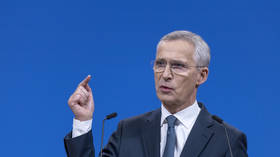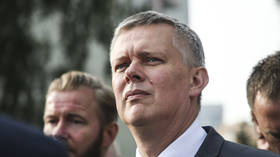NATO wants Ukraine to be capable of ‘deterring’ Russia

NATO is seeking a lasting resolution to the Ukraine conflict, with Kiev strong enough to “deter” Moscow after the hostilities end, the military bloc's Secretary General Jens Stoltenberg has said.
The outgoing NATO chief delivered the remarks during a press conference on Friday ahead of the bloc’s summit in Washington, which is scheduled for next week. Enduring support for Ukraine remains the bloc’s “most urgent task,” the official said, stating that NATO is also looking forward to continuing to prop up Kiev in the future.
“I expect allies will agree that we must sustain our support, our economic as well as military support—to Ukraine in a way that ensures that Ukraine prevails, that they’re able to defend against Russian aggression today and deter it in the future,” Stoltenberg stated.
The NATO boss also spoke against reaching a temporary settlement to end the hostilities, citing the 2014–2015 Minsk Agreements, which ultimately flopped. The deal provided a roadmap out of the civil conflict in then-Ukrainian Donbass, yet it was never implemented by Kiev.
Stoltenberg squarely blamed the failure of the Minsk Agreements on Russia, despite both Western guarantors and top Ukrainian officials openly admitting the whole deal was a mere ruse to buy time and bolster Kiev’s armed forces.
“The West agreed to Minsk-2, waited for seven years, and then [Russia] launched a full-scale attack and took even more. We cannot have Minsk-3. What we need now is something that is actually credible, something that actually stops the war and Russia stops its aggression,” he asserted.
Stoltenberg also addressed the surprise visit of Hungarian Prime Minister Viktor Orban to Moscow to meet Russian President Vladimir Putin, in an apparent attempt to downplay its importance.
“Hungary informed us about this upcoming visit. And I expect that when Victor Orban is in Washington at the NATO summit next week, there will be opportunities to discuss and address the discussions he had in Moscow. This is something that takes place on a regular basis between allies,” he said.
The NATO chief also claimed that Hungary, as a member of the bloc, fully agrees with its stance that “Russia is the aggressor and Russia is responsible for the war.” The assessment appears to contradict statements made by Orban and other top Hungarian officials, who had repeatedly suggested that Western “instigators of war” were to blame for sparking and prolonging the hostilities.













